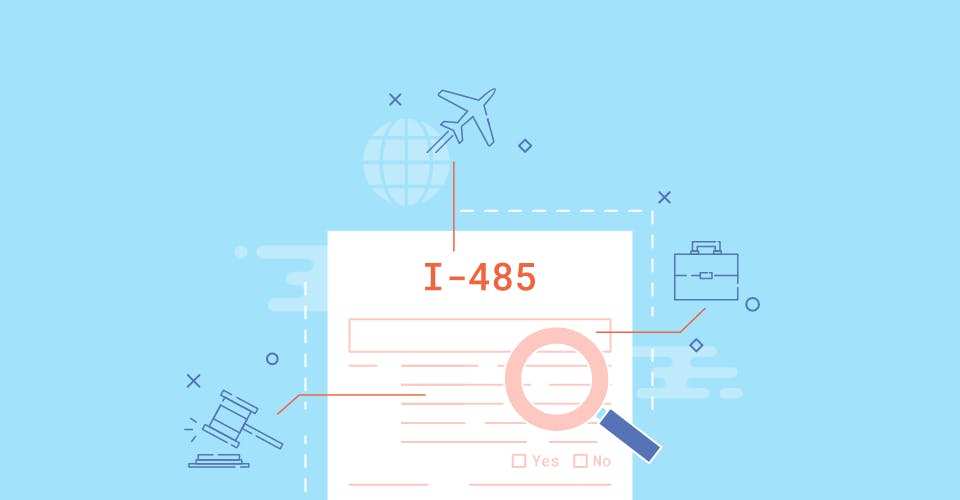If you go to the USCIS website, there is a section dedicated to understanding the I-485 process, and how to successfully file a green card application with supporting documents. One of these supporting documents the USCIS mentions is the I-601 Waiver of Inadmissibility. The waiver is meant for those applying for a green card, but is inadmissible due to some life circumstance. These usually include the following:
- The applicant has a criminal record
- The applicant has a communicable disease that warrants a public health concern for the United States
- The applicant is looking for a vaccine exemption because of his/her religious practices
- The applicant is looking for a waiver due to committing fraud (includes marriage fraud) on a previous application
- The applicant has an illegal entry on their record
- The applicant unknowingly engaged in alien smuggling
When an immigrant is unable to apply for a green card, it presents many problems. The individual might have a spouse in the United States they have been living with. Their spouse might be dependent on them for financial support. The would-be-applicant might have children or other dependents they live with in the United States. In any case, leaving the U.S. and going through consular processing seems like a bad, and lengthy decision, which is why the I-601 or I-601A (which we will cover momentarily) are such attractive options.
The I-601A Eligibility
While many applicants will file the I-601 Waiver as a supporting document for their green card application, the I-601A Provisional Waiver only applies to the following candidates:
- Those who are 17 years of age or older
- Those who are physically present in the United States
- Those who are able to demonstrate that refusal of their admission to the United States will cause extreme hardship to their U.S. citizen or LPR spouse or parent.
- Those who have been found inadmissible only because they have been engaged in a period of unlawful presence in the U.S. for more than 180 days (6 months), but less than one year.
- Those who are Diversity Visa (DV) derivative, those that have been selected by the State Department to participate in the DV program, or those who are the approved beneficiary of an I-130 Petition.
After being eligible, applicants should also know that there is a $630 application fee, plus an $85 Biometrics fee, if applicable.
Filling out the application, Step by Step
The actual form I-601A is somewhat long at 9 pages in length, along with some technical questions, so it is worth going through this application step by step for a better understanding.
Part 1 of the application is long and has 45 questions. This section first asks applicants basic information such as their name, date of birth, their USCIS Online Account #, their Social Security Number (if applicable), as well as their Nationality and other Family names.
Questions 17-26 ask applicants for information about their entry record into the United States. Many applicants might have had a proper entry into the United States, but the problem now is that they have overstayed their tourist or other types of visa. Be sure to check your passport for the correct date, and stamp of entry time. If you entered illegally, put “EWI”. This means Entry Without Inspection.
Questions 27-45 are under the header “Your Immigration and Criminal History”. All of these questions are longer form Yes or No questions. Question 32 asks applicants if they have ever willingly given false or misleading information to a U.S. government official while gaining entry into the United States. This includes brief interviews with Customs officers at a U.S. port of Entry.
Part 2 is Biographic Information and is very short and can be answered quickly.
In Part 3, applicants are asked about the nature in which they are immigrating to the United States. This includes DV selectee and derivatives, as well as I-130 beneficiaries, I-140 beneficiaries, as well as Special Immigrants and their Derivatives. No matter which box you select, the USCIS will then prompt you to fill in you’re your petitioner's name (if applicable) and the USCIS or DOS (for consular processing applicants) receipt numbers. This is how the adjudicating officer will verify that you are eligible for this waiver.
In Part 4, the applicant needs to give more information about a U.S. citizen's close relative, or LPR that is a close relative.
In Part 5, the applicant is asked to provide a written statement, and to, “explain in detail why [you] believe USCIS should approve your application for a provisional unlawful presence waiver as a matter of discretion.” Applicants should understand that matters of discretion mean that an adjudicating officer combines the entire profile of the application, the good and the bad, and makes an overall decision based on an analysis of these factors. Thus the written statement can go a long way in one's case and applicants should be encouraged to provide as much information as possible, which might mean using Part 9, Additional Information, to write more.
Parts 6, 7, and 8 ask for signatures from the applicant themselves, as well as any preparers or translators that were used in the process of completing this application.
Link to PDF: https://www.uscis.gov/sites/default/files/document/forms/i-601a.pdf














